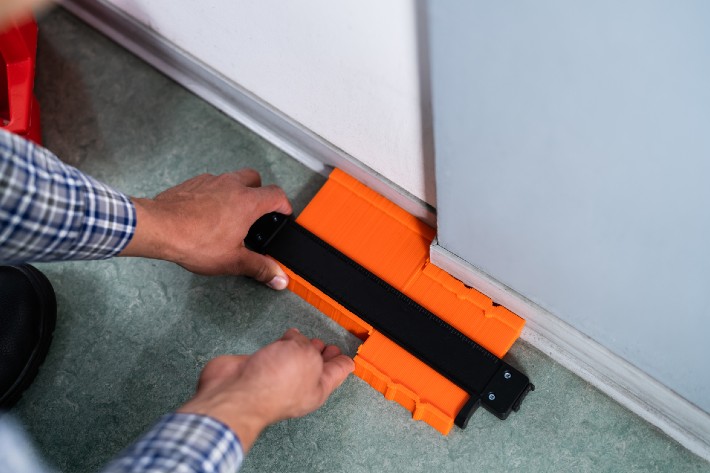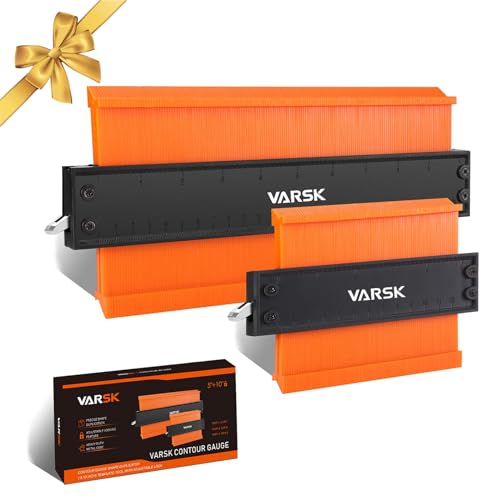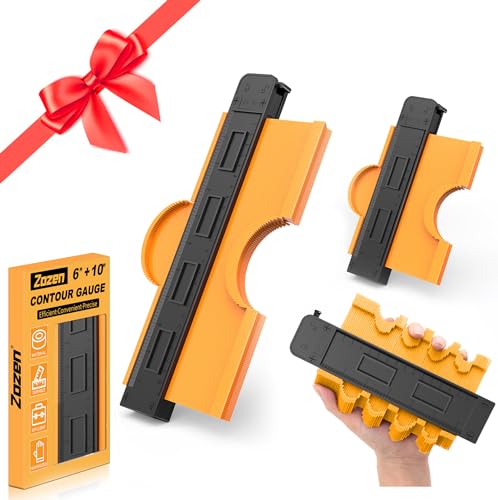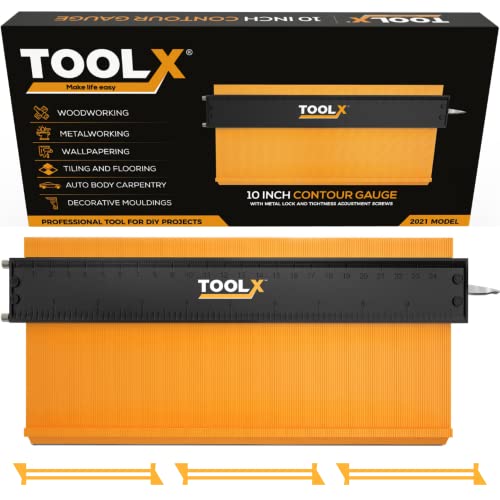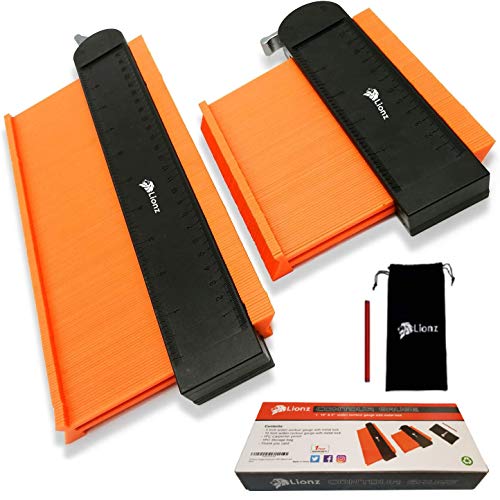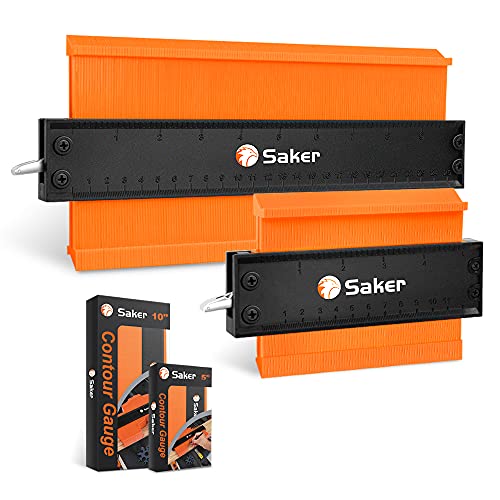- StoreProjects
- Free Plans and Projects
- Furniture Projects
- Jigs And Fixtures Projects
- Shop Projects
- SketchUp Models
- Shop Storage
- Workbenches
- Free Woodworking Downloads From Lee Valley
TechniquesToolsVideos- Premium Streaming Video Site
- Experts Guide to Gluing & Clamping Wood
- Mastering Built-In Furniture
- Simple Live-Edge Slab Table
- CNC – Designed for Woodworkers
- Milling Your Own Lumber
- Advanced Bandsaw Techniques
- I Can Do That! – Simple Woodworking Projects
- Woodwright’s Shop with Roy Underhill
- Tricks of the Trade
BlogOur content is meticulously curated through independent research, testing, reviews, and AI-driven recommendations, all designed to present you with the finest product choices. When you make a purchase through our links, it could result in us earning a commission.The Best Contour Gauges For Home Renovations
Last updated: 1 Mar 2024
- Best Overall: VARSK Contour Gauge Shop Now ➔
- Runner Up: Zozen Contour Gauge Shop Now ➔
- Best Value For Money: Toolx Contour Gauge Shop Now ➔
- Budget-Friendly: LionZ Contour Gauge Shop Now ➔
- Woodworker’s Pick: Saker Contour Gauge Shop Now ➔
View all ContentsHere Is the Best Contour Gauge of 2024
Best Overall
We bring you our best overall contour gauge choice available by VARSK. It has one of the highest precisions on the market and is great for use on pipes where careful profiling is required. Its use is not limited to pipes. Each pin is 0.05 inches wide giving a high resolution of 20 pins per inch providing each detail to be marked smoothly. Each pin goes 2.5 inches deep to get the perfect fit. One great feature of this contour gauge is the metal lock. The core is made out of heavy-duty metal, which allows the pins to lock in place while working. VARSK contour gauge is ideal for measuring moldings for reproduction, pipe fitting, flooring, copying curves, and other profiling jobs.
Pros
- A heavy-duty metal core allows precise duplication
- Unique tightness adjustment system
- Highest resolution of 20 pins per inch
Cons
- Allen key can be misplaced
Runner Up
If you are a beginner DIY enthusiast and are planning to buy a contour gauge that is simple and beginner-friendly, then this is the right contour gauge for you. The entire gauge is completely made out of plastic which makes it extremely lightweight. Each pin is about 0.06 inches wide and has a depth of 2.3 inches giving it ample precision and use in extensive applications. The pins are made of durable ABS plastic which keeps your furniture scratch-free and does not rust. The set includes a 10-inch and a 6-inch tool, each useful in its place. You should be careful and treat the contour tool delicately as it is made completely out of plastic.
Pros
- Gets locked tightly
- Glides very smoothly on any surface
Cons
- Teeth can bend because of the small width
Best Value For Money
This plastic contour gauge is one of the most accurate in providing you with a contour. With each pin 0.06 inches wide and 2.9 inches in depth, you can profile any corner or edge with ease. A strong aluminum core and locking system on the contour gauge enable precise measurements. There are also tightness adjustment screws included at the side of the gauge rather than an Allen key that is difficult to store. This Toolx duplication tool is the perfect gift for your husband and father who love to do DIY projects. However, there is only a 10-inch duplicator included.
Pros
- Easy tightness adjustment system
- Ample resolution of 16 pins per inch
- Very accurate and precise
- No Allen key that is difficult to store and use
Cons
- Not as fine as metal gauges
Budget-Friendly
This contour gauge is one of the most pocket-friendly ones available. With a large 10-inch tool for big shapes and a smaller 5-inch gauge to copy smaller shapes, it is very handy. The metal locking mechanism can lock the measured profile in place till you need and the aluminum core is very durable. It comes with a free carrying bag so that you can carry and store the contour gauge tool. Each pin is about 0.059 inches wide and has an adequate depth of 3 inches. This budget contour tool is perfect for fitting tiles, laminating, carpeting, and checking dimensions for your DIY projects.
Pros
- High resolution of 17 pins per inch
- Perfect for DIY and small projects
- Strong aluminum core and lock
Cons
- Pins are prone to bending
Woodworker’s Pick
If you are looking for a decent and professional contour gauge duplication tool, then this is the one for you. Although it is costly, this tool is certainly worth the price it asks for. Each pin is 0.063 inches wide and 2.4 inches in depth and are great to use for flat surfaces and other extensive applications. The contour gauge is easy to carry due to its lightweight. It is made out of high-quality ABS plastic and rustproof metalcore and lock. Other than flat surfaces, you can also use this contour gauge for small pipes. The lock can easily hold the pins firmly in place till you have traced the contoured object. This includes a complete set of a 10-inch and a 5-inch wide contour gauge.
Pros
- Easy to use
- Well worth the price
- Great gift for men
Cons
- Allen key can get lost
The Ultimate Buying Guide for Contour Gauges
What Are Contour Gauges?
A contour gauge is a profiling tool used to duplicate and record shapes of surfaces. They consist of multiple metals or plastic pins aligned together in a row. The entire purpose of this duplication tool is to transfer the shape of an object onto another material such as paper, wood, or tiles. A contour gauge enables you to cut out complex shapes which are tough to measure using ordinary measuring tools such as a ruler or a measuring tape.
Contour gauges have been around since the 1900s and were popular in the 1980s. Contour gauges are useful engineering and construction tools that have multiple uses. Many folks do not know about this tool so we have written a buying guide to help you purchase the right contour gauge for your projects. This guide will cover the applications and various important factors to consider when choosing the best contour gauge.
Applications of Contour Gauges
Contour gauges have a wide variety of applications in many fields of work. Contour gauges can be very useful if you are dealing with flooring, pipe fitting, model duplication, cross-sectioning, metal works, and auto vehicle repair. The main advantage of this duplication tool is its ease of use which allows even a beginner to map out shapes.
Benefits of Contour Gauges
Contour gauges are a measuring tool designed to duplicate the shape of an object. Contour gauges are more precise than the typical measuring tools such as rulers. Rather than having to sit down and take multiple readings with a ruler, or calculate each angle using trigonometry, you can copy the shape onto paper without any effort using a contour gauge. This saves a lot of your time.
Contour gauges are also easy to use. Just place them against your desired object and push till needed. The pins slide in adapting to the shape of the object. You can now lock the pins in place and duplicate the shape on your material.
In the long run, contour gauges are also cost-effective. They prove to make DIY projects simple so you no longer have to hire a professional for repair.
Factors to Consider
Size or width
Contour gauges come in several sizes. The longer 10-inches gauge can duplicate a longer contour and is enough to cover all typical edges, corners, door frames, and other objects. There are also smaller 5-inch or 6-inch gauges available that can squeeze into tight spaces.
Pin depth
One of the most crucial factors dependent on your scope of work is the pin depth. Pin depth lies between 2 to 3.5 inches. 2 inches is perfect for small diameter pipes and flat surfaces. 2.5 inches is enough to be able to profile most trims and moldings. Meanwhile, 3.5 inches is adequate for nearly all objects.
Pin number or resolution
Resolution is vital for any kind of tool. The more the resolution of a device, the more precise it is. A contour gauge has a resolution in terms of the number of pins per inch. A higher resolution on a contour gauge means that it can replicate a much closer copy of the original shape. A low-resolution contour gauge can be used where precision is not necessary.
Pin material
Pin material is a crucial factor when deciding which contour gauge to buy. The two materials pins come in are metal and plastic. Metal has a lot of advantages over plastic such as being much stronger and more durable. Also, metal contour gauges have a higher resolution than plastic ones. However, the metal pins can easily scratch furniture if force is applied. Quality plastic contour gauges consist of a metal core to hold the pins in place which increases their durability.
Joinable parts
There are contour gauges available that allow you to attach multiple units. When you are profiling a larger area, using a single gauge and taking repeated readings can be tedious and can lead to errors. Stackable or joinable contour gauges are a great solution for this problem.
Lock
A locking mechanism is crucial to have on a contour gauge. While there are contour gauges available that are tight enough to stay in place, they may get loose over time. A locking mechanism allows you to transfer the shape that you have profiled and duplicate it onto another material. A lever or clamp is placed on the side of contour gauges to lock the pins in place so that you can do your work without misaligning the pins.
Adjustability
High-quality contour gauges use screws and Allen keys to adjust the tightness of the pins. This is a huge factor to consider because over time. The pins can grow to be tight or loose, which can cause imprecise measurements and difficulty in use.
People Also Asked
Which is better out of a plastic and a metal contour gauge?
There are different uses for both plastic and metal contour gauges. Plastic contour gauges have a lower resolution but can keep your furniture scratch-free. Plastic gauges are also lightweight and can remain rust-free. Metal gauges, on the other hand, are much stronger and more durable compared to their plastic counterparts. Even though they are tougher than plastic, they can still be bent if misplaced. Metal gauges also have a higher resolution compared to plastic.
What pin resolution should I pick?
For simple shapes and corners, a high resolution is completely unnecessary and can be done by a low-resolution contour gauge. As the complexity of the shape increases, it is much better to have a higher resolution. For tiling and baseboard requirements, even a contour gauge with an average resolution is adequate.
How to adjust the tightness of the pins?
There are different mechanisms in different contour gauges to adjust the tightness of the pins. High-quality contour gauges usually have screws that are driven by an Allen key or by hand to adjust the tightness of the pins. Simply turn the screw clockwise till you find the pins satisfactorily tight enough.
Article Contributors
Read More About Popular Woodworking Reviews Team HereThe Popular Woodworking Review Team’s product reviews and comprehensive guides are here to help you select the best gear and tools to efficiently complete top-quality woodworking projects.
Popular Woodworking is reader-supported: When you buy through links on our site, we may earn an affiliate commission. Artificial Intelligence (large language models) may have been used in the research and creation of the content.
Questions about product testing or a specific articles should be sent to aimperiapt@gmail.com

